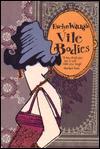Blogger's Book Club -- Vile Bodies

The first selection for the BBC was Vile Bodies by Evelyn Waugh. This was my first book by Waugh, which might be surprising as I'm a huge fan of high modern literature (Ernest Hemingway's The Sun Also Rises was, in fact, one of the primary reasons I became a writer). Waugh's novel is a satirical but often dark (as good satires are) exploration of the upper echelons of society, a part of society that seems inevitably doomed to extinction. The story is led by a poor, struggling, observant writer -- Adam Fenwick Symes -- who emerges, like Jake Barnes in Hemingway's novel, as the antiheroic hero of the novel. The center of the story is his up and down, on-again, off-again comedic romance (as opposed to romantic comedy) with his fiance Nina and their experiences with the smart set of society, a group of young, rich, and bored individuals who can't seem to find real fulfillment from life, not that they want to (largely due to being young, rich, and bored). Even though we know that Adam is doomed to be alone on a battle field, we find ourselves sympathetic with him, cheering for him in some ways, while at the same time rolling with laughter at his flailings.
Initially, I found myself getting lost in the story. There were too many characters and the somewhat disjointed prose made it easy to get lost. I found myself having to re-read the first few chapters just to keep up with what was taking place. But after awhile, largely due to the emergence of Adam as the main character, I found myself drawn to the story. The fast-paced prose seems to mirror the fast-pace of the characters, and the fragmentation of the prose -- in skipping from one scene to the next -- seems parallel to the fragmentation of life itself. Waugh does not seem as interested in delving into the psychology of individual characters (though each character is unique and believeable, most seem a "type" more than anything else) as he does with delving into the society itself. The antics are over the top, but this makes us accept their actions more easily; we are not looking for realism here but instead a fantasy of reality.
What seemed most interesting about the book is how it transcends time. While we could say that this type of society died in the early 20th century, its relevance today -- in terms of gossip and our obsession with celebrity -- seems profound. Could we not see Paris Hilton as the post-modern Nina and Kimberly Stewart as Agatha? Perhaps the Olsen twins and Hilary Duff and Lindsay Lohan could be the angels of the 21st century?

4 Comments:
Superb write up Theresa. Glad you liked the book as well and I totally agree about its relevance today. Should we start compiling a list of options for book two?
Who else has posted about it?
Yeah, let's start thinking about it!
So far only you, Kim, and I have posted about it. I have some ideas for book two and perhaps we should ask for suggestions.
Well, I'll be leaving for Spain in two days, so I totally trust your pick! (We could go from the list we generated last time.)
Post a Comment
<< Home